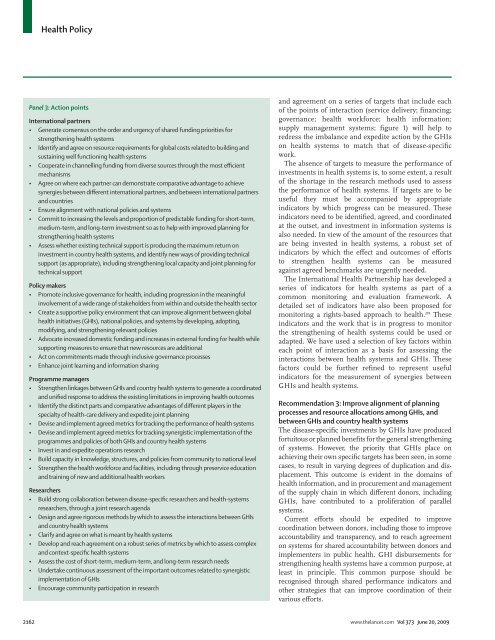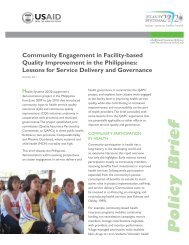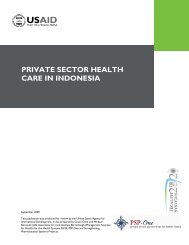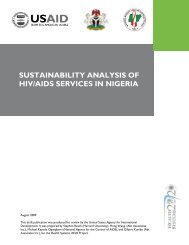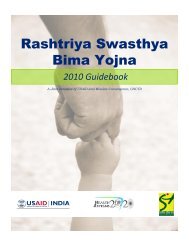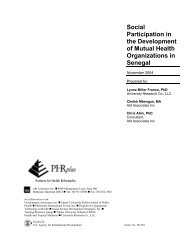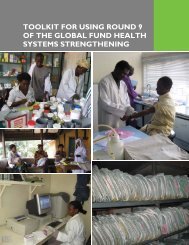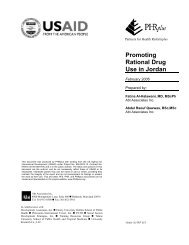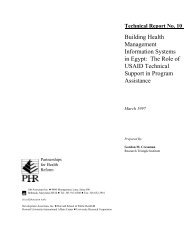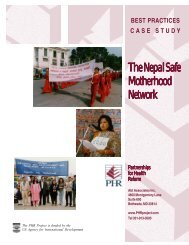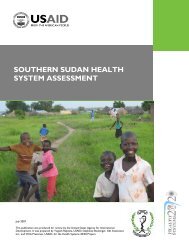An assessment of interactions between global ... - ResearchGate
An assessment of interactions between global ... - ResearchGate
An assessment of interactions between global ... - ResearchGate
You also want an ePaper? Increase the reach of your titles
YUMPU automatically turns print PDFs into web optimized ePapers that Google loves.
Health Policy<br />
Panel 3: Action points<br />
International partners<br />
• Generate consensus on the order and urgency <strong>of</strong> shared funding priorities for<br />
strengthening health systems<br />
• Identify and agree on resource requirements for <strong>global</strong> costs related to building and<br />
sustaining well functioning health systems<br />
• Cooperate in channelling funding from diverse sources through the most efficient<br />
mechanisms<br />
• Agree on where each partner can demonstrate comparative advantage to achieve<br />
synergies <strong>between</strong> different international partners, and <strong>between</strong> international partners<br />
and countries<br />
• Ensure alignment with national policies and systems<br />
• Commit to increasing the levels and proportion <strong>of</strong> predictable funding for short-term,<br />
medium-term, and long-term investment so as to help with improved planning for<br />
strengthening health systems<br />
• Assess whether existing technical support is producing the maximum return on<br />
investment in country health systems, and identify new ways <strong>of</strong> providing technical<br />
support (as appropriate), including strengthening local capacity and joint planning for<br />
technical support<br />
Policy makers<br />
• Promote inclusive governance for health, including progression in the meaningful<br />
involvement <strong>of</strong> a wide range <strong>of</strong> stakeholders from within and outside the health sector<br />
• Create a supportive policy environment that can improve alignment <strong>between</strong> <strong>global</strong><br />
health initiatives (GHIs), national policies, and systems by developing, adopting,<br />
modifying, and strengthening relevant policies<br />
• Advocate increased domestic funding and increases in external funding for health while<br />
supporting measures to ensure that new resources are additional<br />
• Act on commitments made through inclusive governance processes<br />
• Enhance joint learning and information sharing<br />
Programme managers<br />
• Strengthen linkages <strong>between</strong> GHIs and country health systems to generate a coordinated<br />
and unified response to address the existing limitations in improving health outcomes<br />
• Identify the distinct parts and comparative advantages <strong>of</strong> different players in the<br />
specialty <strong>of</strong> health-care delivery and expedite joint planning<br />
• Devise and implement agreed metrics for tracking the performance <strong>of</strong> health systems<br />
• Devise and implement agreed metrics for tracking synergistic implementation <strong>of</strong> the<br />
programmes and policies <strong>of</strong> both GHIs and country health systems<br />
• Invest in and expedite operations research<br />
• Build capacity in knowledge, structures, and policies from community to national level<br />
• Strengthen the health workforce and facilities, including through preservice education<br />
and training <strong>of</strong> new and additional health workers<br />
Researchers<br />
• Build strong collaboration <strong>between</strong> disease-specific researchers and health-systems<br />
researchers, through a joint research agenda<br />
• Design and agree rigorous methods by which to assess the <strong>interactions</strong> <strong>between</strong> GHIs<br />
and country health systems<br />
• Clarify and agree on what is meant by health systems<br />
• Develop and reach agreement on a robust series <strong>of</strong> metrics by which to assess complex<br />
and context-specific health systems<br />
• Assess the cost <strong>of</strong> short-term, medium-term, and long-term research needs<br />
• Undertake continuous <strong>assessment</strong> <strong>of</strong> the important outcomes related to synergistic<br />
implementation <strong>of</strong> GHIs<br />
• Encourage community participation in research<br />
and agreement on a series <strong>of</strong> targets that include each<br />
<strong>of</strong> the points <strong>of</strong> interaction (service delivery; financing;<br />
governance; health workforce; health information;<br />
supply management systems; figure 1) will help to<br />
redress the imbalance and expedite action by the GHIs<br />
on health systems to match that <strong>of</strong> disease-specific<br />
work.<br />
The absence <strong>of</strong> targets to measure the performance <strong>of</strong><br />
investments in health systems is, to some extent, a result<br />
<strong>of</strong> the shortage in the research methods used to assess<br />
the performance <strong>of</strong> health systems. If targets are to be<br />
useful they must be accompanied by appropriate<br />
indicators by which progress can be measured. These<br />
indicators need to be identified, agreed, and coordinated<br />
at the outset, and investment in information systems is<br />
also needed. In view <strong>of</strong> the amount <strong>of</strong> the resources that<br />
are being invested in health systems, a robust set <strong>of</strong><br />
indicators by which the effect and outcomes <strong>of</strong> efforts<br />
to strengthen health systems can be measured<br />
against agreed benchmarks are urgently needed.<br />
The International Health Partnership has developed a<br />
series <strong>of</strong> indicators for health systems as part <strong>of</strong> a<br />
common monitoring and evaluation framework. A<br />
detailed set <strong>of</strong> indicators have also been proposed for<br />
monitoring a rights-based approach to health. 218 These<br />
indicators and the work that is in progress to monitor<br />
the strengthening <strong>of</strong> health systems could be used or<br />
adapted. We have used a selection <strong>of</strong> key factors within<br />
each point <strong>of</strong> interaction as a basis for assessing the<br />
<strong>interactions</strong> <strong>between</strong> health systems and GHIs. These<br />
factors could be further refined to represent useful<br />
indicators for the measurement <strong>of</strong> synergies <strong>between</strong><br />
GHIs and health systems.<br />
Recommendation 3: Improve alignment <strong>of</strong> planning<br />
processes and resource allocations among GHIs, and<br />
<strong>between</strong> GHIs and country health systems<br />
The disease-specific investments by GHIs have produced<br />
fortuitous or planned benefits for the general strengthening<br />
<strong>of</strong> systems. However, the priority that GHIs place on<br />
achieving their own specific targets has been seen, in some<br />
cases, to result in varying degrees <strong>of</strong> duplication and displacement.<br />
This outcome is evident in the domains <strong>of</strong><br />
health information, and in procurement and management<br />
<strong>of</strong> the supply chain in which different donors, including<br />
GHIs, have contributed to a proliferation <strong>of</strong> parallel<br />
systems.<br />
Current efforts should be expedited to improve<br />
coordination <strong>between</strong> donors, including those to improve<br />
accountability and transparency, and to reach agreement<br />
on systems for shared accountability <strong>between</strong> donors and<br />
implementers in public health. GHI disbursements for<br />
strengthening health systems have a common purpose, at<br />
least in principle. This common purpose should be<br />
recognised through shared performance indicators and<br />
other strategies that can improve coordination <strong>of</strong> their<br />
various efforts.<br />
2162 www.thelancet.com Vol 373 June 20, 2009


